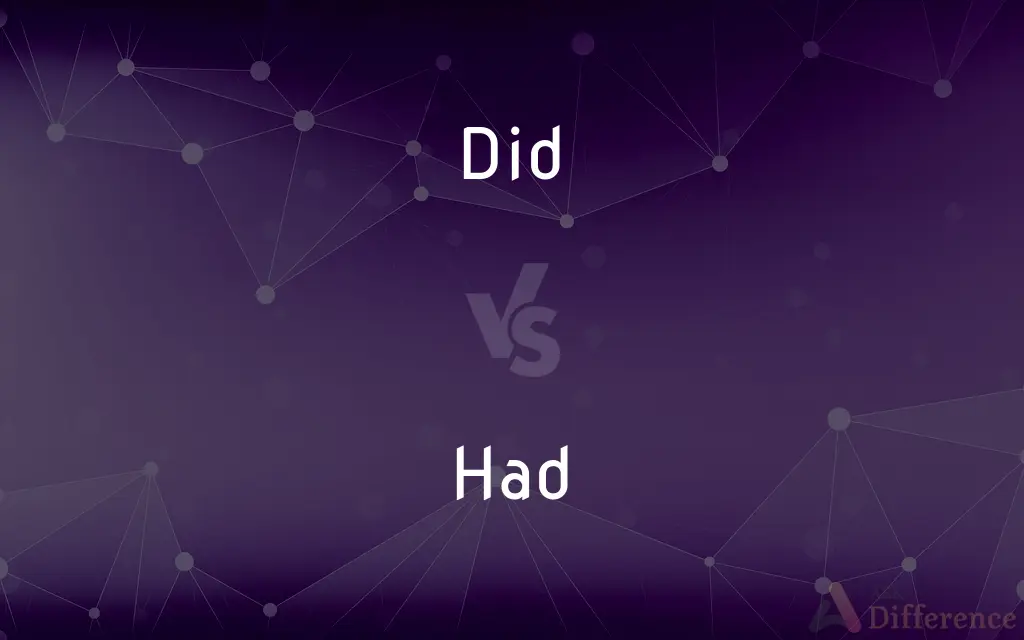Did vs. Had — What's the Difference?
By Tayyaba Rehman — Published on October 6, 2023
“Did” is the past tense of “do,” used to form negative and interrogative sentences or emphasize actions; “had” is the past form of “have,” indicating possession or completion of action. They are used in different grammatical and contextual situations.

Difference Between Did and Had
Table of Contents
ADVERTISEMENT
Key Differences
"Did" is primarily used to construct interrogative and negative sentences in the Simple Past Tense, giving structure to inquiries and negations about past actions, such as "Did you eat?" or "I did not go." It is pivotal for formulating questions and denials regarding activities or states that occurred in the past. In contrast, "Had" is versatile, depicting past possession like "He had a car," or forming the Past Perfect Tense as in "She had lived there for years," indicating completed actions relative to other past events.
Tayyaba Rehman
Oct 06, 2023
"Did" and "Had" are essential auxiliary verbs in English, each serving distinct grammatical functions. "Did" is the past tense form of "do," typically used to form questions, negative statements, or to emphasize actions in the past. It assists in interrogative and negative structures in the Simple Past Tense. Conversely, "Had" is the past tense and past participle form of "have," used to indicate possession, or it can function as an auxiliary in the Past Perfect Tense to signify actions completed before another point in the past.
Tayyaba Rehman
Oct 06, 2023
Structurally, "Did" often requires the base form of the main verb to form coherent sentences, like "Did you play?" Here, "play" is in its base form. "Had," on the other hand, necessitates the past participle form of the verb when used as an auxiliary, such as in "She had finished," where "finished" is the past participle of "finish."
Tayyaba Rehman
Oct 06, 2023
In summary, while "Did" and "Had" are both auxiliary verbs used in the construction of different tenses, they serve distinct purposes in grammatical structures and convey different nuances in the temporal layering of actions and states.
Tayyaba Rehman
Oct 06, 2023
In terms of emphasis, "Did" can be employed to emphasize the action carried out, especially in affirmative statements. It accentuates the occurrence of the action in the past, such as in "I did finish my homework." Meanwhile, "Had," when used in the Past Perfect Tense, emphasizes the completion of an action before another occurred, offering depth to the sequencing and timing of past actions, as seen in "By the time we arrived, the play had already started."
Tayyaba Rehman
Oct 06, 2023
ADVERTISEMENT
Comparison Chart
Grammatical Function
Past tense form of "do."
Past tense and past participle form of "have."
Tayyaba Rehman
Oct 06, 2023
Usage
Forms questions, negatives, and emphasized actions in Simple Past Tense.
Indicates possession or forms Past Perfect Tense.
Tayyaba Rehman
Oct 06, 2023
Verb Form Required
Requires the base form of the main verb.
Requires the past participle form of the main verb.
Tayyaba Rehman
Oct 06, 2023
Contextual Application
Interrogative and negative structures in past actions or states.
Depicts past possession or completed actions relative to other past events.
Tayyaba Rehman
Oct 06, 2023
Emphasis
Emphasizes the action carried out in the past.
Emphasizes the completion of an action before another occurred.
Tayyaba Rehman
Oct 06, 2023
ADVERTISEMENT
Definitions
Did
Used to form interrogative sentences in the past.
Did you complete your assignment?
Tayyaba Rehman
Sep 24, 2023
Had
Indicates a completed action before another point in the past.
By the time we reached, the train had already left.
Tayyaba Rehman
Sep 24, 2023
Did
Past tense of "do," used to form negative sentences in the past.
I did not understand the question.
Tayyaba Rehman
Sep 24, 2023
Had
Depicts past possession or ownership of something.
She had a vast collection of classical music.
Tayyaba Rehman
Sep 24, 2023
Did
Used to emphasize an action in the affirmative, past statements.
I did try my best to win the game.
Tayyaba Rehman
Sep 24, 2023
Had
Past tense of "have," indicating possession in the past.
He had a beautiful house by the lake.
Tayyaba Rehman
Sep 24, 2023
Did
Acts as an auxiliary verb to formulate questions about past actions or states.
Did he mention anything about the meeting?
Tayyaba Rehman
Sep 24, 2023
Had
Used as an auxiliary verb to form the Past Perfect Tense.
They had never seen such a magnificent view.
Tayyaba Rehman
Sep 24, 2023
Did
Used to make negative statements in the Simple Past Tense.
She did not want to join us for dinner.
Tayyaba Rehman
Sep 24, 2023
Had
Represents having experienced or undergone something in the past.
We had a wonderful time at the carnival.
Tayyaba Rehman
Sep 24, 2023
Had
Simple past tense and past participle of have|cap=1.
This morning I had an egg for breakfast.
A good time was had by all.
Tayyaba Rehman
Nov 04, 2021
Had
Used to form the past perfect tense, expressing an action that took place prior to a reference point that is itself in the past.
I felt sure that I had seen him before.
Tayyaba Rehman
Nov 04, 2021
Had
See Have.
And lever me is be pore and trewe.[And more agreeable to me it is to be poor and true.]
Him had been lever to be syke.[To him it had been preferable to be sick.]
For him was lever have at his bed's headTwenty bookes, clad in black or red, . . . Than robes rich, or fithel, or gay sawtrie.
Poor lady, she were better love a dream.
You were best hang yourself.
Me rather had my heart might feel your loveThan my unpleased eye see your courtesy.
I hadde levere than my scherte,That ye hadde rad his legende, as have I.
I had as lief not be as live to beIn awe of such a thing as I myself.
I had rather be a dog and bay the moon,Than such a Roman.
I had rather be a doorkeeper in the house of my God, than to dwell in the tents of wickedness.
Tayyaba Rehman
Nov 04, 2021
FAQs
Can “Did” be used for emphasis?
Yes, “Did” can be used to emphasize the action carried out in affirmative past statements.
Tayyaba Rehman
Oct 06, 2023
What is the function of “Had” in a sentence?
“Had” is the past form of “have,” used to indicate past possession or as an auxiliary verb to form the Past Perfect Tense.
Tayyaba Rehman
Oct 06, 2023
What does “Did” represent?
“Did” is the past tense of “do,” used to form interrogative and negative sentences or emphasize actions in the Simple Past Tense.
Tayyaba Rehman
Oct 06, 2023
Is “Had” used to indicate completed actions?
Yes, “Had” is used to indicate actions that were completed before another point in the past when functioning as an auxiliary verb.
Tayyaba Rehman
Oct 06, 2023
Author Spotlight
Written by
Tayyaba RehmanTayyaba Rehman is a distinguished writer, currently serving as a primary contributor to askdifference.com. As a researcher in semantics and etymology, Tayyaba's passion for the complexity of languages and their distinctions has found a perfect home on the platform. Tayyaba delves into the intricacies of language, distinguishing between commonly confused words and phrases, thereby providing clarity for readers worldwide.

















































